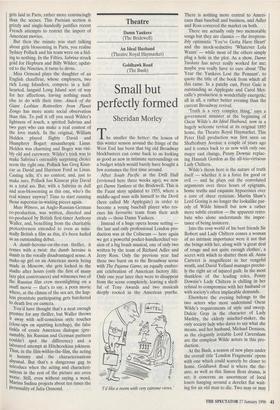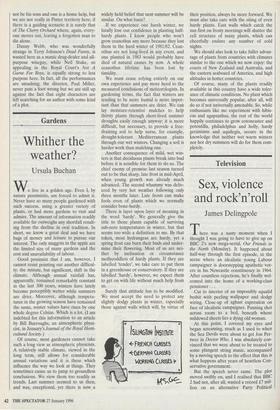Theatre
Damn Yankees (The Bridewell) An Ideal Husband (Theatre Royal Haymarket) Goldhawk Road (The Bush)
Small but perfectly formed
Sheridan Morley
The smaller the better: the lesson of this winter season around the fringe of the West End has been that big old Broadway blockbusters can come back to us looking as good as new in intimate surroundings on a budget which would barely have bought a few costumes the first time around.
After South Pacific at the Drill Hall (reviewed here three weeks ago), we now get Damn Yankees at the Bridewell. This is the Faust story updated to 1955, where a middle-aged man sells himself to the Devil (here called Mr Applegate) in order to become a young baseball player who res- cues his favourite team from their arch rivals — those Damn Yankees.
Instead of a huge opera house setting the last and only professional London pro- duction was at the Coliseum — here again we get a powerful pocket-handkerchief ver- sion of a big brash musical, one of only two written by the team of Richard Adler and Jerry Ross. Only the previous year had these two burst on to the Broadway scene with The Pajama Game, an equally exuber- ant celebration of American factory life. Only one year later they were to disappear from the scene completely, leaving a shelf- ful of Tony Awards and two musicals deeply rooted in the American psyche.
'I'd like a room with very extreme views.' There is nothing more central to Ameri- cana than baseball and business, and Adler and Ross cornered the market on both.
There are actually only two memorable songs but they are classics — the irrepress- ibly optimistic 'You've Gotta Have Heart' and the mock-seductive 'Whatever Lola Wants' — while most of the others simply plug a hole in the plot. As a show, Damn Yankees has never really worked for me; maybe you really have to care about 'The Year the Yankees Lost the Pennant', to quote the title of the book from which all this came. In a patchy cast, Peter Gale is outstanding as Applegate and Carol Met- calfe's production is wonderfully energetic; all in all, a rather better evening than the current Broadway revival.
`Truth is a very complex thing,' says a government minister at the beginning of Oscar Wilde's An Ideal Husband, now in a hugely welcome revival at its original 1895 home, the Theatre Royal Haymarket. This Peter Hall production was first seen on Shaftesbury Avenue a couple of years ago and it comes back to us now with only one major cast change, Penny Downie replac- ing Hannah Gordon as the all-too-virtuous Lady Chiltern.
Wilde's thesis here is the nature of truth itself — whether it is a force for good or evil — and he plays out the convoluted arguments over three hours of epigrams, home truths and exquisite hypocrisies over a core of sheer cynicism. Martin Shaw's Lord Goring is no longer the lookalike par- ody of Wilde himself but now a rather more subtle creation — the apparent retro- bate who alone understands the impor- tance of being insincere.
Into the cosy world of his best friends Sir Robert and Lady Chiltern comes a woman of no intrinsic importance were it not that she brings with her, along with 'a great deal of rouge and not quite enough clothes', a secret with which to shatter them all. Anna Carteret is magnificent in her vengeful wrath, and David Yelland manages precise- ly the right air of injured guilt. In the most thankless of the leading roles, Penny Downie's Lady Chiltern is chilling in her refusal to compromise with her husband or with society's often implacable demands. Elsewhere the evening belongs to the two actors who most understand Oscar Wilde's requirements of style and sweep. Dulcie Gray in the character of Lady Markby, the elderly mischief-maker, the only society lady who dares to say what she means, and her husband, Michael Denison, as the elegantly irritable Lord Caversham are the compleat Wilde actors in this pro- duction.
At the Bush, a season of new plays under the overall title 'London Fragments' opens with one which could scarcely be closer to home. Goldhawk Road is where the the- atre, as well as this Simon Bent drama, is set; it concerns an assortment of local losers hanging around a derelict flat wait- ing for an old man to die. Two may or may not be his sons and one is a home help, but we are not really in Pinter territory here; if there is a guiding scenario it is surely that of The Cherry Orchard where, again, every- one moves out, leaving a forgotten man to die alone.
Danny Webb, who was wonderfully strange in Terry Johnson's Dead Funny, is wasted here as a manic drug-dealer and all- purpose wiseguy, while Neil Stuke, so appealing in the Royal Court's Not A Game For Boys, is equally strong to less purpose here. In fact, all the performances are smashing; the director, Paul Miller, never puts a foot wrong but we are still up against the fact that eight characters are left searching for an author with some kind of a plot.



























































 Previous page
Previous page